Hello and welcome to Episode 19 of Read Paradise Lost with me, Jane Davis, a podcast and Substack newsletter about my project to read all of Paradise Lost by John Milton, aloud, and with a sometimes word-by-word, sometimes line-by-line discussion. This is a one-take recording with no editing, so forgive noise of seagulls, my coughing, or sound of men drilling next door. Rough and ready reading is what you get.
See Episode 1 for an introduction to the project.
Last week we finished with Beelzebub arguing to the fallen angels that they should turn their attention to the newly created place, Earth, and the newly created race, Man.
Today’s portion is just over 30 lines, so I’ll read it all, then talk about it…
Thither let us bend all our thoughts, to learn
What creatures there inhabit, of what mould, [ 355 ]
Or substance, how endu'd, and what thir Power,
And where thir weakness, how attempted best,
By force or suttlety: Though Heav'n be shut,
And Heav'ns high Arbitrator sit secure
In his own strength, this place may lye expos'd [ 360 ]
The utmost border of his Kingdom, left
To their defence who hold it: here perhaps
Som advantagious act may be achiev'd
By sudden onset, either with Hell fire
To waste his whole Creation, or possess [ 365 ]
All as our own, and drive as we were driven,
The punie habitants, or if not drive,
Seduce them to our Party, that thir God
May prove thir foe, and with repenting hand
Abolish his own works. This would surpass [ 370 ]
Common revenge, and interrupt his joy
In our Confusion, and our Joy upraise
In his disturbance; when his darling Sons
Hurl'd headlong to partake with us, shall curse
Thir frail Original, and faded bliss, [ 375 ]
Faded so soon. Advise if this be worth
Attempting, or to sit in darkness here
Hatching vain Empires. Thus Beelzebub
Pleaded his devilish Counsel, first devis'd
By Satan, and in part propos'd: for whence, [ 380 ]
But from the Author of all ill could Spring
So deep a malice, to confound the race
Of mankind in one root, and Earth with Hell
To mingle and involve, done all to spite
The great Creatour?
This is one of those places in the poem where I feel time slips. As Beelzebub (and behind him, Satan) eye Earth with a view to spoiling it, I feel I am in the here and now, (as opposed to being somewhere in Milton’s imagination, or the time of the Genesis myth). This place, here, now, Beelzebub claims, is ‘left/To their defence who hold it’ - and that’s what sends a ‘here, now’ shiver down my back. Oh no, it’s all up to us: we are the defenders of truth and goodness and the good, and look around, we’re not doing too well.
I was telling a fellow reader about this moment - and earlier we had been talking about a Gorge Saunders story, ‘Love Letter’. (Read or listen here). As I went on about my fear of being a non-defender, she suddenly turned to me and said, ‘What’s this got to do with the George Saunders story?’
This thought shook me because I’d been complaining about the story (George Saunders is in my view probably the greatest living writer in English, so not my usual stance in relation to anything he has written) because it seemed to demand some kind of action I can’t imagine being useful, perhaps some protest, some political demonstration. I don’t think protest, demonstration, is how the world changes, is how good is done. But the story says, I think, you can’t just have small moments of personal goodness or love. And that had bothered me, because what else is there?
So, my friend’s thought, ‘is there a connection’ threw me.
But she was right. Like the people in Saunders’s short story, like us, Milton was living in dangerous times, times in which he often decided to speak (or write) out. The lead character in Saunders’ story does jigsaws to pass the time and doesn’t think there is any action he can take to prevent the loss of democracy and the rise of a demagogue…though he once wrote a letter, and is told by a police officer, ‘keep off the typewriter’.
Dear reader, does this seem a massive aside? Please read or listen to ‘Love Letter’, and then let’s look back to the poem.
Earth is ‘left/To their defence who hold it’.
I ask myself, am I doing enough defending? What would defending ‘the good’ even look like? I hope reading on in the poem is going to help me work on understanding that.
Beelzebub imagines great outcomes if the fallen angels try their luck, one way or another, on Earth;
here perhaps
Som advantagious act may be achiev'd
By sudden onset, either with Hell fire
To waste his whole Creation, or possess [ 365 ]
All as our own, and drive as we were driven,
The punie habitants, or if not drive,
Seduce them to our Party, that thir God
May prove thir foe, and with repenting hand
Abolish his own works.
I found it sad and moving and psychologically real that Beelzebub longs to ‘drive as we were driven’ – that all-too-human compulsion to repeat the action that we have suffered. And if not that then to ‘seduce’ them, to occupy the devils position in opposition to God and thus cause him to ‘abolish his own works’.
This would surpass [ 370 ]
Common revenge, and interrupt his joy
In our Confusion, and our Joy upraise
In his disturbance; when his darling Sons
Hurl'd headlong to partake with us, shall curse
Thir frail Original, and faded bliss, [ 375 ]
Faded so soon.
I am brought up sharp by the language here, by the thinking held in the language, thinking through syntax: ‘interrupt his joy/In our Confusion, and our Joy upraise/In his disturbance’ It’s almost like a mathematical equation - there are four things in complex almost physical relationship - his joy, our confusion, our Joy, his disturbance.
And, reeling from this switcheroo, we find again we experience the desire to pass on the trauma, as the language is now literally word for word the language of Book 1, when Satan was ‘hurl’d headlong’ from Heaven.
At the ‘faded, bliss,/Faded so soon’, I’m feeling that some echo of self-sadness may be in Beelzebub’s voice - remembering, as all the fallen angels do, their Heavenly life, their lost life. Seeing that pain also in the plan for man.
Beelzebub finishes by asking,
Advise if this be worth
Attempting, or to sit in darkness here
Hatching vain Empires.
Vote for this, guys! Let’s go and hit some poor schmucks.
That ‘hatching’ is a sort of reverse image of the opening of Book 1 when Milton described the spirit of God, who
with mighty wings outspread [ 20 ]
Dove-like satst brooding on the vast Abyss
And mad'st it pregnant:
The hatching of Hell’s most powerful destruction, seems a back-to-front mirror of the great initial act of creation.
Beelzebub’s speech is over and now we hear the voice of Milton himself;
Thus Beelzebub
Pleaded his devilish Counsel, first devis'd
By Satan, and in part propos'd: for whence, [ 380 ]
But from the Author of all ill could Spring
So deep a malice, to confound the race
Of mankind in one root, and Earth with Hell
To mingle and involve, done all to spite
The great Creatour?
Milton, our Greek Chorus here, tells us what we could only surmise - that Beelzebub and Satan have hatched this plot put forth in Beelzebub’s speech, of the assault on Man, and in fact Milton is certain that this idea originates only from Satan, ‘for whence, /But from the Author of all ill could Spring/So deep a malice.’
As readers we must ask, am I with Milton? Do I want to locate ‘all ill’ in one place, in one entity? I am reminded of common responses to public tragedies - school shootings, terrible attacks on innocent people - which often call up the word ‘evil’. As if our natural human desire is to put such stuff in place separate from ourselves. Is Satan, for Milton, such a place, or container?
In the next few lines I’m thinking of the strong sense of ordinary reality I find in ‘to confound the race/Of mankind in one root, and Earth with Hell/To mingle and involve.’
Good and evil sometimes seem totally separated and yet things, here and now, are not at all clear cut, some people who do bad can also do good, bad may have causes, good people have bad moments/elements. Some of those guys beating up the other poor fellows are just men who’ve been out of work for three generations and no longer know what being a man means. They may be good dads to their kids, kind to their dogs.
We may try but we can’t separate ourselves out into pure and impure. So for me Beelzebub is suddenly speaking about the here and now, where Earth is mingled with Hell, where we can’t - or only rarely can - disentangle them.
George Saunders is a writer of stories where that mingling is ever present. Read him!
More next week.


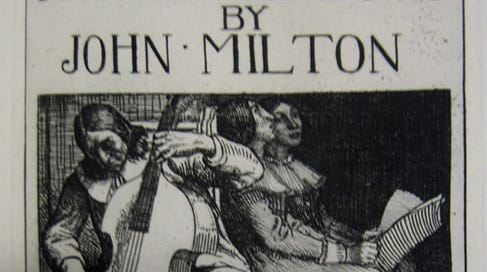



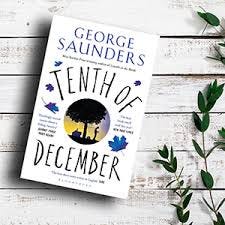


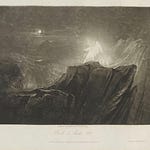
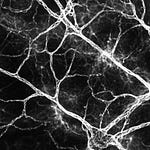



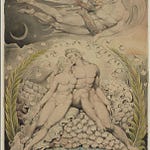
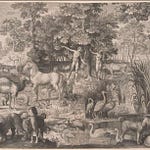
Share this post